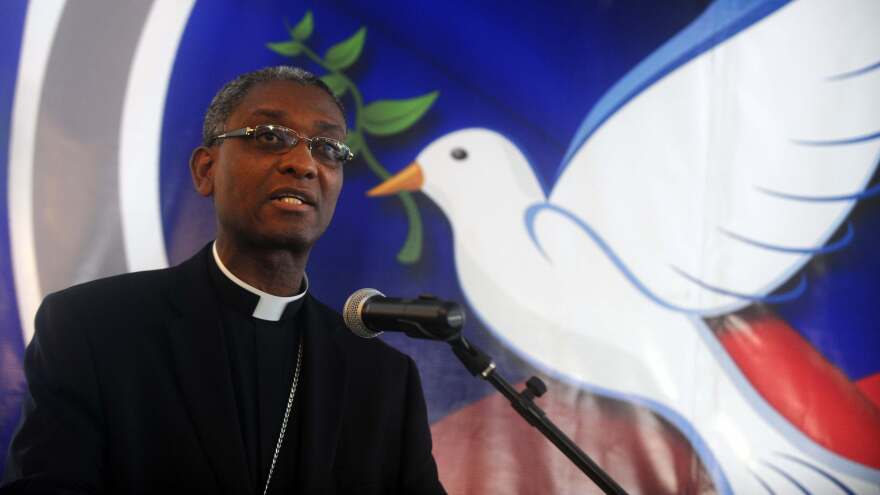Later this month, Pope Francis will welcome his first appointments to the College of Cardinals. Among the 19 men chosen for elevation are seven from Central and South America, the Caribbean and Africa. This, say observers, reflects the pope's belief that the church must pay more attention to the poor.
One comes from Haiti, a country with a long, troubled history with the Catholic Church.
Bishop Chibly Langlois says he was skeptical when he heard he'd been chosen.
"I know it from my friends before I know it from the official people who could tell me this news," Langlois says.
You can understand his suspicion, reading the news online before getting the official call from the Vatican. The good word came Jan. 12, the fourth anniversary of Haiti's devastating earthquake.
Langlois says he had no idea he was being considered. He was ordained in 1991 and is the bishop of the southern Haiti dioceses in Les Cayes. Most cardinals are higher-ranking archbishops. Despite his promotion, he still sees himself as a priest, the direct link between the church and the people.
"When you feel the call to be a priest, you're called to be a priest," he says. "It's not to be a bishop."
Langlois is the first Haitian to be appointed cardinal. He's soft-spoken, smiles at the end of every sentence and says he's uncomfortable using English, just one of five languages he knows.
Haiti's Struggles
Duke University historian Laurent Dubois says Haiti and the Vatican had a rough start.
"After its independence in 1804, Haiti actually was refused recognition pretty much by all the global powers, France particularly — its former colonizer — the United States and others," Dubois says. "The Vatican joined that. They refused recognition to Haiti longer than any country, except the United States, until 1860."
In more recent years, the church has sparred with Haiti's dictators, serving as a voice for the political opposition.
And after the earthquake, the Catholic Church assumed the role of any other aid group: providing grief and trauma counseling, offering health care and rebuilding homes and hospitals. Langlois says Catholics lost many churches in the disaster, and it's been a struggle to rebuild all of them.
Dubois says the pope's pick of a Haitian reflects an evolution in the church.
"It's a little hard, perhaps to have imagined it during the past decades, when the Catholic Church has been embroiled on so many levels in very difficult political contexts within Haiti," he says.
Haitians revere Feb. 7, 1986, as the date dictatorship on the Caribbean nation ended and the struggle for democracy began.
A New Focus On Poverty
This Feb. 7, Langlois organized a national day of prayer. Catholics around Haiti gathered at churches like St. Therese de l'Enfant Jesus to pray for safe and fair elections later this year. St. Therese was once a towering brick building. Toppled in the earthquake, it's now rows of pews underneath two nylon tents.
Outside St. Therese, parishioner Marthe Adeline Dumornay says Haiti only stands to benefit from Langlois's elevation.
"Jesus Christ goes directly into the heart of the pope," she says. "Jesus sees the bad things in Haiti and he wants to lift Haiti up. Jesus, through the pope, chose the cardinal to work better for Haiti."
Langlois knows his pick represents a shift in church power. He agrees with Pope Francis's focus on social justice and the poor. In Haiti and beyond, Langlois says, that's not just financial.
"Many people can have money, but they are very poor," he says. "They don't have the right riches."
He'll divide time between Rome and Les Cayes, where he'll continue on as bishop and priest, saying mass regularly.
Copyright 2022 NPR. To see more, visit https://www.npr.org.


